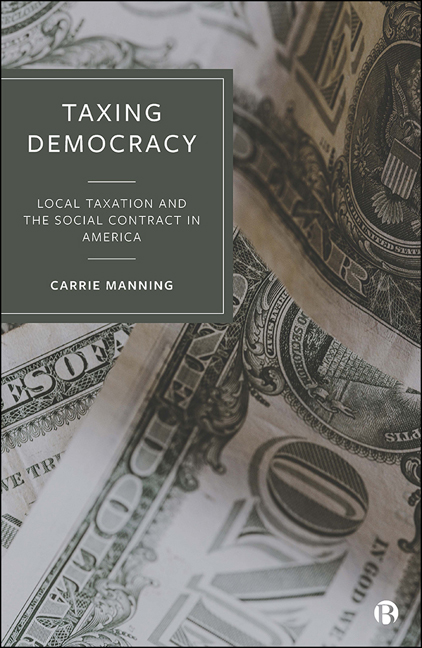Book contents
- Frontmatter
- Contents
- Acknowledgments
- 1 Taxes and the Social Contract
- 2 States, Taxes, and the Polities They Create
- 3 The US Tax State and the Limited Social Contract
- 4 Tax and Expenditure Limitations vs. an Expanding Social Contract
- 5 Implications of the Reliance on Fines and Fees
- 6 Taxing Democracy: Conclusions
- Notes
- References
- Index
4 - Tax and Expenditure Limitations vs. an Expanding Social Contract
Published online by Cambridge University Press: 20 January 2024
- Frontmatter
- Contents
- Acknowledgments
- 1 Taxes and the Social Contract
- 2 States, Taxes, and the Polities They Create
- 3 The US Tax State and the Limited Social Contract
- 4 Tax and Expenditure Limitations vs. an Expanding Social Contract
- 5 Implications of the Reliance on Fines and Fees
- 6 Taxing Democracy: Conclusions
- Notes
- References
- Index
Summary
Introduction
The last half-century in the United States has been marked by two highly consequential and starkly contrasting social movements: the civil rights movement and the conservative tax revolt. Together, they help illustrate the two principal claims of this book. First, tax bargains set at the time of state consolidation tend to become ‘taken for granted’ arrangements that inscribe the scope and roles of the state and the boundaries of the political community entitled to protection and services from the state. The tax bargain entrenches the political and economic power of dominant actors at the time the bargain is set, and those advantages gain momentum and widen the gap between them and others not privileged by the tax bargain and the social contract it supported. Second, when those understandings are challenged at ‘critical junctures’ by social or political mobilization that seeks to expand the role of the state and the political community, the tax bargain serves as a rally point and a concrete policy tool to support an agenda of resistance to change.
Using the language of taxes has sometimes helped deflect charges of racial bias and discrimination. The conservative tax revolt, for example, is couched in a language of individual responsibility and merit, but it was born at least in part in reaction to the expansion of the social contract brought on by the civil rights movement. As a June 2020 essay in The New York Times on the racial wealth gap put it, ‘white Americans have long known that in a country where black people have been kept disproportionately poor and prevented from building wealth, rules and policies involving money can be nearly as effective for maintaining the color line as legal segregation’ (Hannah-Jones, 2020, p 35).
Half a century after the start of the modern conservative tax revolt, we can trace its imprint in regressive state and local tax models that rely more than ever before on sales taxes, less on property taxes, and more on fines and fees. According to Strand and Mirkay (2019), most states have doubled their sales tax rates since 1970, with no corresponding change in the top income tax rate. State sales and excise taxes fall most heavily on the poor: the effective tax rate for the poorest third of taxpayers is 7.1 per cent, for the middle third it is 4.8 per cent, and for the highest third 0.9 per cent.
- Type
- Chapter
- Information
- Taxing DemocracyLocal Taxation and the Social Contract in America, pp. 65 - 90Publisher: Bristol University PressPrint publication year: 2023



